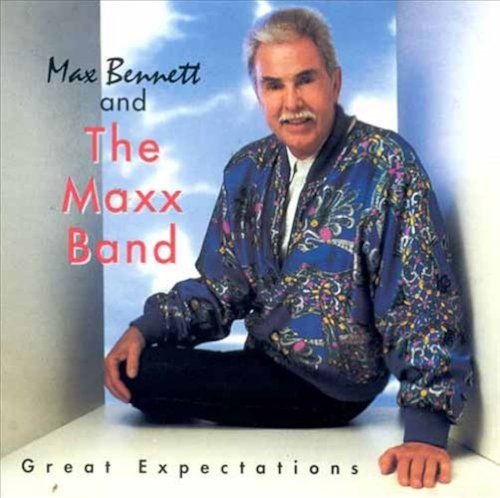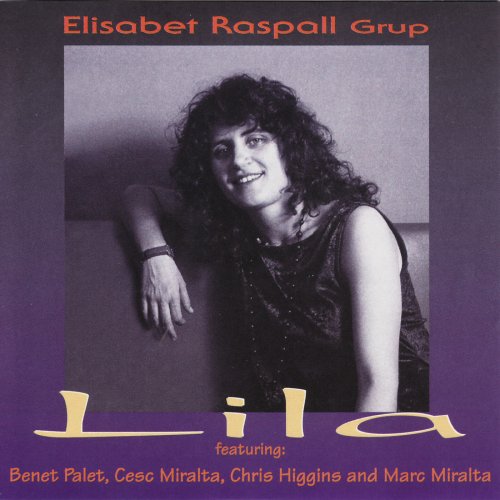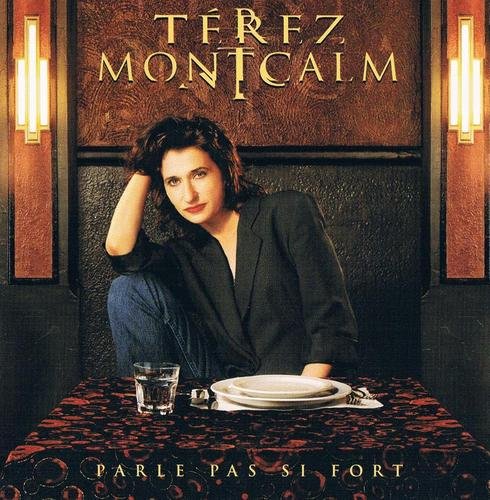Markus Pawlik, Antoni Wit - Moszkovski: Concerto for Piano and Orchestra, Suite for Orchestra (1998)
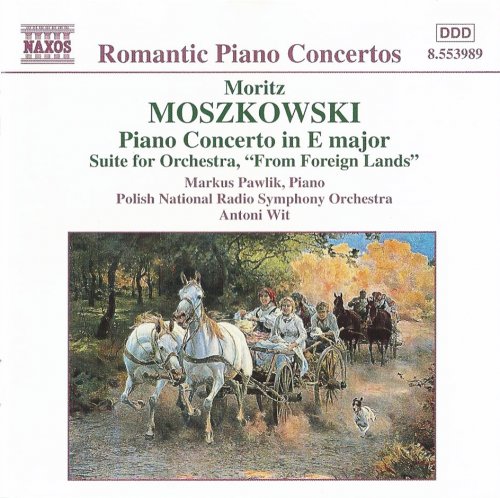
Artist: Markus Pawlik, Antoni Wit
Title: Moszkovski: Concerto for Piano and Orchestra, Suite for Orchestra
Year Of Release: 1998
Label: Naxos
Genre: Classical
Quality: FLAC (image+.cue,log,scans)
Total Time: 61:01
Total Size: 278 mb
WebSite: Album Preview
Tracklist: Title: Moszkovski: Concerto for Piano and Orchestra, Suite for Orchestra
Year Of Release: 1998
Label: Naxos
Genre: Classical
Quality: FLAC (image+.cue,log,scans)
Total Time: 61:01
Total Size: 278 mb
WebSite: Album Preview
Moritz Moszkowski (1854-1925)
Piano Concerto In E Major, Op. 59
1. I. Moderato 12:54
2. II. Andante 8:52
3. III. Scherzo: Vivace 7:15
4. IV. Allegro Deciso 9:34
From Foreign Lands, Op. 23
5. I. Russian - Allegretto 2:56
6. II. Italian - Presto 3:58
7. III. German - Andante 5:48
8. IV. Spanish - Molto Vivace 2:26
9. V. Polish - Allegro Con Fuoco 3:53
10. VI. Hungarian - Molto Allegro 3:14
Performers:
Markus Pawlik - piano
Polish Radio National Symphony Orchestra in Katowice
Antoni Wit - conductor
If I were a castaway on a desert island and given the choice of only three concertos to keep me company, this would have to be one of them because its enchanting melodies and its genial disposition could not fail to raise my spirits.
I first came across the name Moritz Moszkowski when I bought a Decca LP in 1969 called España. It was a collection of orchestral works inspi../graphics/red by the colour and rhythms of Spain. One of the items was the orchestral version of Moszkowski's Spanish Dances, originally sco../graphics/red for piano. I was impressed enough, and my curiosity stimulated sufficiently, to snap up the Vox recording (STGBY 647) of Moszkowski's Piano Concerto, with Michael Ponti and the Philharmonia Hungarica conducted by Hans Richard Stracke, when it appea../graphics/red the following year. I was bowled over by it. Hyperion recorded it with the Paderewski concerto as the first in their Romantic Piano Series, in 1991, with Piers Lane and the BBC Scottish Symphony Orchestra conducted by Jerzy Maksymiuk. (Hyperion CDA66452); and other recordings have appea../graphics/red on the Ondine, CBC and Audiofon labels Now comes this Naxos super budget version.
Before I listened to the new Naxos recording, I took down the Vox/Ponti recording and listened to it once more as a comparison to Pawlik's reading. I have to say that for me Ponti still remains supreme (over Lane as well).
Moszkowski's Concerto, composed in 1898, is in four movements and in the unusual key of E-Major. It is elegant but outgoing, sunny and boisterous but also tender; its melodies are truly memorable and in the Andante, achingly beautiful.
The opening Moderato is substantial - the timing of Pawlik's reading is 12:54. There are many glittering bravura passages in this movement and both Ponti and Pawlik impress with their virtuosity - Ponti and Stracke are lucid, and powerful, and sensitive by turn while Pawlik is perhaps a little more thoughtful and restrained. Ponti is superb in the beautiful Andante, he tiptoes through the hushed, delicate, filigree structure of the early part of the movement with considerable grace. Wit's accompaniment lacks charm, it's heavy-handed, considerably inhibiting Pawlik's more sombre reading although how much this might be due to the engineering is difficult to say. However, when it comes to the big Romantic theme, Pawlik can compete with Ponti in terms of expressive intensity. The most memorable movement in the concerto has to be the very demanding quick-silver Scherzo. Here Ponti wins hands down. His sheer dexterity is breath-taking. The pacing, tempi, dynamics, shading and phrasing are perfection but most importantly Ponti's playing conveys an irresistible joie de vivre that escapes Pawlik (and, almost, Lane). This joy spills over into the exuberant last movement which almost reminds one of Paris nightclubs and the can-can. Here Pawlik does let his hair down and he and Wit are a match, if not slightly better than Ponti and Stracke. But its the lasting impression of the headlong vitality and radiance of Ponti's Scherzo that lingers in the memory; if you see this LP in a second hand shop snap it up. (I understand that it has been transfer../graphics/red to CD in a two box VOX set with concerti by Rubinstein, Scharwenka and Thalberg (CDX5066).
An appreciation of Moszkowski is well overdue. He composed operas, ballets, orchestral suites, songs, concertos and chamber music yet his reputation rests mainly on this concerto and a few piano pieces. He was a considerable concert pianist and a respected influential teacher - many illustrious pianists such as Joseph Hofmann were amongst his students. He was held in high esteem by Liszt. He helped Paderewski with the publication of his works and for a time he coached Sir Thomas Beecham in orchestration. Yet he died in near poverty in Paris in 1925.
The Suite for Orchestra: From Foreign Lands is undemanding light music - vignettes of musical styles from Russia, Italy, Germany, Spain, Poland and Hungary. All are pleasant but mostly unmemorable. The strongest, not surprisingly, considering the success of the Spanish Dances, is the Spanish - molto vivace movement. Antoni Wit and the Polish orchestra play these little pieces with appropriate dash and colour.
In short this new Naxos is worthy of serious consideration but for the Concerto go for Ponti. -- Ian Lace
I first came across the name Moritz Moszkowski when I bought a Decca LP in 1969 called España. It was a collection of orchestral works inspi../graphics/red by the colour and rhythms of Spain. One of the items was the orchestral version of Moszkowski's Spanish Dances, originally sco../graphics/red for piano. I was impressed enough, and my curiosity stimulated sufficiently, to snap up the Vox recording (STGBY 647) of Moszkowski's Piano Concerto, with Michael Ponti and the Philharmonia Hungarica conducted by Hans Richard Stracke, when it appea../graphics/red the following year. I was bowled over by it. Hyperion recorded it with the Paderewski concerto as the first in their Romantic Piano Series, in 1991, with Piers Lane and the BBC Scottish Symphony Orchestra conducted by Jerzy Maksymiuk. (Hyperion CDA66452); and other recordings have appea../graphics/red on the Ondine, CBC and Audiofon labels Now comes this Naxos super budget version.
Before I listened to the new Naxos recording, I took down the Vox/Ponti recording and listened to it once more as a comparison to Pawlik's reading. I have to say that for me Ponti still remains supreme (over Lane as well).
Moszkowski's Concerto, composed in 1898, is in four movements and in the unusual key of E-Major. It is elegant but outgoing, sunny and boisterous but also tender; its melodies are truly memorable and in the Andante, achingly beautiful.
The opening Moderato is substantial - the timing of Pawlik's reading is 12:54. There are many glittering bravura passages in this movement and both Ponti and Pawlik impress with their virtuosity - Ponti and Stracke are lucid, and powerful, and sensitive by turn while Pawlik is perhaps a little more thoughtful and restrained. Ponti is superb in the beautiful Andante, he tiptoes through the hushed, delicate, filigree structure of the early part of the movement with considerable grace. Wit's accompaniment lacks charm, it's heavy-handed, considerably inhibiting Pawlik's more sombre reading although how much this might be due to the engineering is difficult to say. However, when it comes to the big Romantic theme, Pawlik can compete with Ponti in terms of expressive intensity. The most memorable movement in the concerto has to be the very demanding quick-silver Scherzo. Here Ponti wins hands down. His sheer dexterity is breath-taking. The pacing, tempi, dynamics, shading and phrasing are perfection but most importantly Ponti's playing conveys an irresistible joie de vivre that escapes Pawlik (and, almost, Lane). This joy spills over into the exuberant last movement which almost reminds one of Paris nightclubs and the can-can. Here Pawlik does let his hair down and he and Wit are a match, if not slightly better than Ponti and Stracke. But its the lasting impression of the headlong vitality and radiance of Ponti's Scherzo that lingers in the memory; if you see this LP in a second hand shop snap it up. (I understand that it has been transfer../graphics/red to CD in a two box VOX set with concerti by Rubinstein, Scharwenka and Thalberg (CDX5066).
An appreciation of Moszkowski is well overdue. He composed operas, ballets, orchestral suites, songs, concertos and chamber music yet his reputation rests mainly on this concerto and a few piano pieces. He was a considerable concert pianist and a respected influential teacher - many illustrious pianists such as Joseph Hofmann were amongst his students. He was held in high esteem by Liszt. He helped Paderewski with the publication of his works and for a time he coached Sir Thomas Beecham in orchestration. Yet he died in near poverty in Paris in 1925.
The Suite for Orchestra: From Foreign Lands is undemanding light music - vignettes of musical styles from Russia, Italy, Germany, Spain, Poland and Hungary. All are pleasant but mostly unmemorable. The strongest, not surprisingly, considering the success of the Spanish Dances, is the Spanish - molto vivace movement. Antoni Wit and the Polish orchestra play these little pieces with appropriate dash and colour.
In short this new Naxos is worthy of serious consideration but for the Concerto go for Ponti. -- Ian Lace
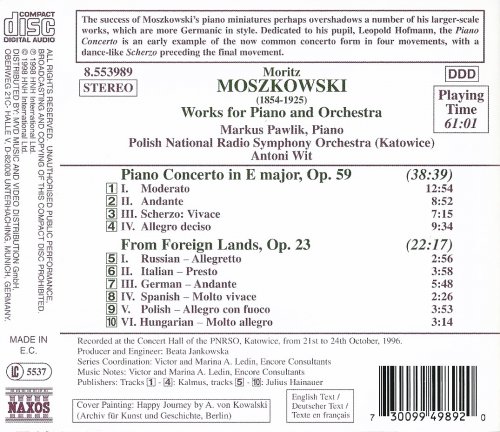
DOWNLOAD FROM ISRA.CLOUD
Markus Pawlik Antoni Wit Moszkovski Concerto for Piano 98 2111.rar - 278.6 MB
Markus Pawlik Antoni Wit Moszkovski Concerto for Piano 98 2111.rar - 278.6 MB
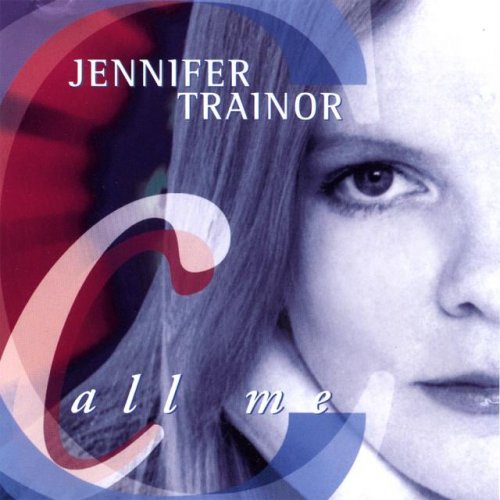
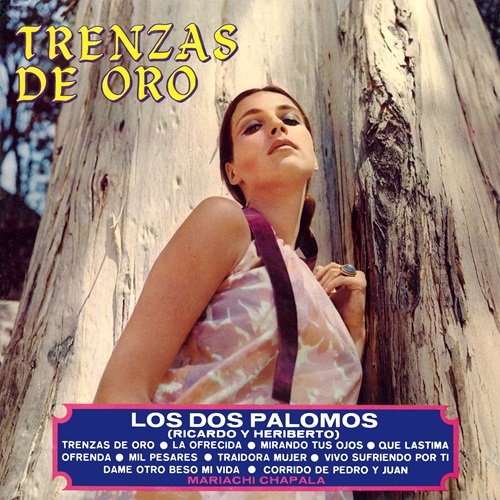
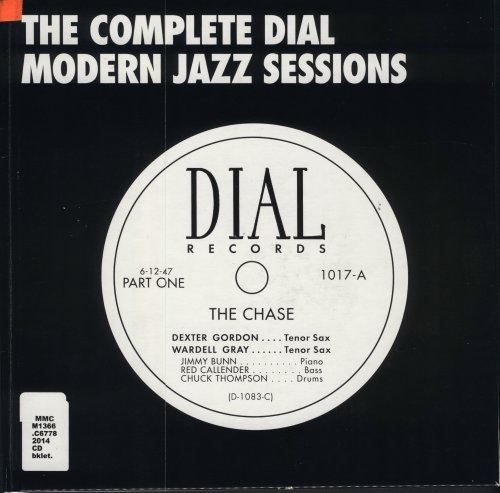

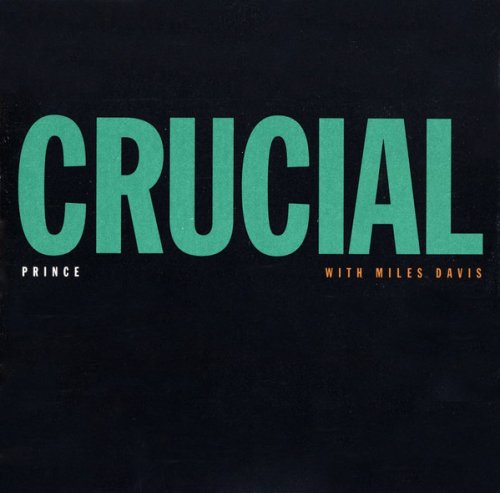
![Organic Pulse Ensemble - Bamboo Noodles (2025) [Hi-Res] Organic Pulse Ensemble - Bamboo Noodles (2025) [Hi-Res]](https://www.dibpic.com/uploads/posts/2026-01/1767515726_l8l51uoc94s2b_600.jpg)
